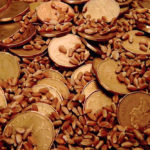
Impacts on ag expected as COVID-19 rocks markets
Farmers urged to manage expenses

Fraser: What will be the long-term impact of COVID-19?
Analysis: A pandemic runs the risk of driving nations further apart

Business risk management program reforms in development
Changes expected to be announced in July

Debate over seed royalties could be nearing end
A pilot project could be the beginning of the end for this long-standing issue

Regulators harming not helping: Maple Leaf exec
Canadian policies are ‘hurting economic growth and competitiveness’

Youth council could be positive step in solving labour shortage
The group will help inform future agriculture policy by engaging younger industry members

Lawmakers urged to pass CUSMA quickly
The bulk of concerns were raised by the dairy sector which is losing market share

CFA urges government to better consider agriculture
The sector shouldn’t be ‘collateral damage’ when government direction is set

Tipping point nears as rail blockades continue
Farmers are innocent bystanders who are getting hit hard, and a crisis is looming

Fraser: Feds still undecided on future of seed royalties
Either system will cost farmers, but proponents say the return will be worth it


